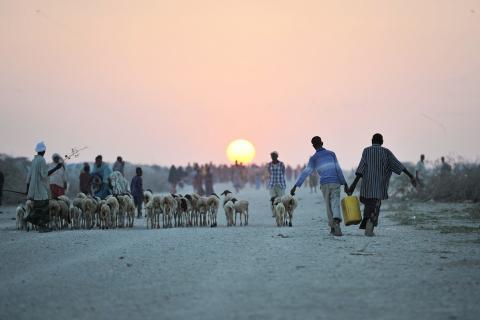Topics and Regions
Rick has over 40 years experience working in the land sector in Southern Africa. He is part of the Land Portal knowledge engagement team working to research and develop knowledge resources including data stories, blogs and in-depth country profiles for Southern, Central and Eastern Africa.
Rick is also a Senior Research Associate with Phuhlisani NPC - a South African land sector NGO and the curator of specialist Southern African land news and analysis website https://knowledgebase.land
He has just moved to the BlueSky social media platform @africaland.bsky.social
He has a PhD from the University of Cape Town. His research in Langa, Cape Town features as the central case study in a recent book Urban Planning in the Global South (2018), co-authored with the late Vanessa Watson, which examines the on-going contestations over land and housing in the rapidly growing cities of the global South.
Details
Location
Contributions
Displaying 281 - 290 of 470Africa’s Land Use Problem: Is Green Revolution Agriculture a Solution or a Cause?
It is a myth that the only way to increase productivity on existing agricultural lands is through Green Revolution programmes and evidence shows that they are among the principal causes of unsustainable land use.
ANC's Expropriation Bill fails, but 'door not shut on land reform conversation'
Bruce Whitfield gets comment from Associate Professor of Law Elmien Du Plessis (North West University).
Audio from the interview is available from Radio 702
It took three years to get to this point, but the National Assembly has rejected the ANC policy on the expropriation of land without compensation.
MPs reject land expropriation amendment in South Africa
The National Assembly has failed to pass the Constitutional Amendment Bill to allow for expropriation of land without compensation.
On Tuesday, the ANC failed to convince parties and muster the two-thirds majority vote it needed to push the bill through.
Only 204 MPs voted in favour of the bill, while 145 voted against it.
During the debate, ad hoc committee chairperson Dr Mathole Motshekga said the amendment bill sought to address a crime against the African majority.
Data rescue of historical data on forced removals in South Africa
The University of Cape Town’s (UCT) research data service DataFirst is an internationally-certified African repository, having been awarded a CoreTrustSeal endorsement in 2018
A framework to scale citizen participation in urban development
This working paper summarises our understanding of a framework to support the scaling of participatory development in low-income urban neighbourhoods in the global South. The discussion addresses constraints that have previously been identified both in the academic literature and through social movements and support agencies seeking citizen inclusion. Our study demonstrates the importance of working with all key stakeholders, including organised communities, urban social movements, academics, professionals and City authorities.
How does climate exacerbate root causes of conflict in Zimbabwe?
Pathway #1: Food insecurity and competition over access and use of natural resources
(I) The effects of the climate crisis can impact food, land, and water systems in various ways, reducing their production and productivity, increasing food insecurity and potentially lead to conflict because of the reduced opportunity costs of participating in violent acts.






